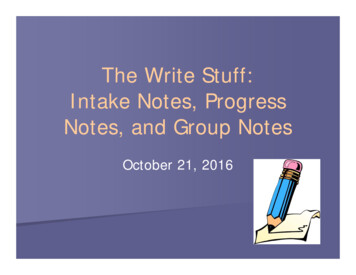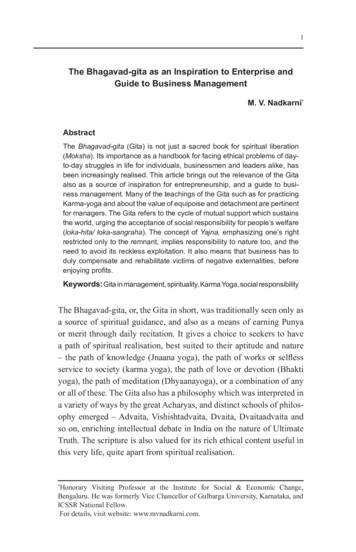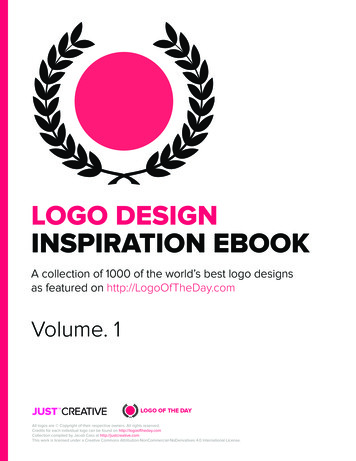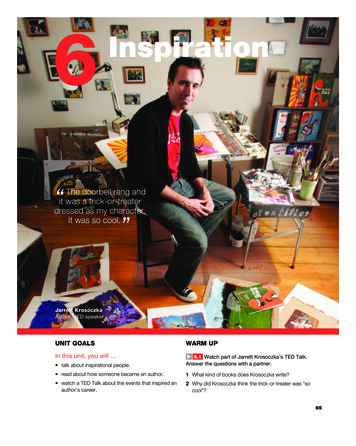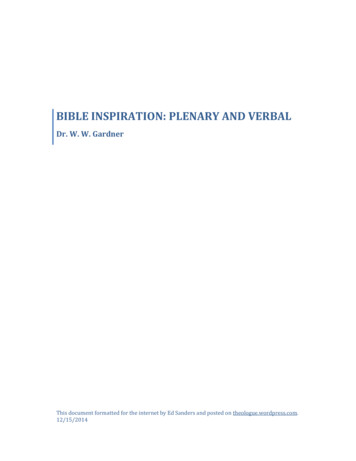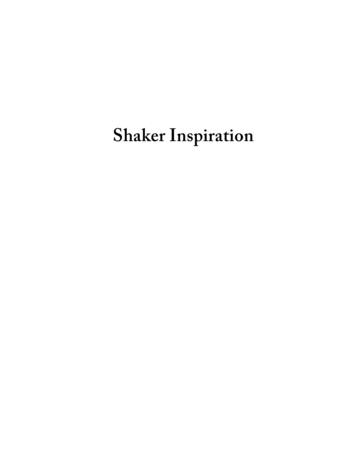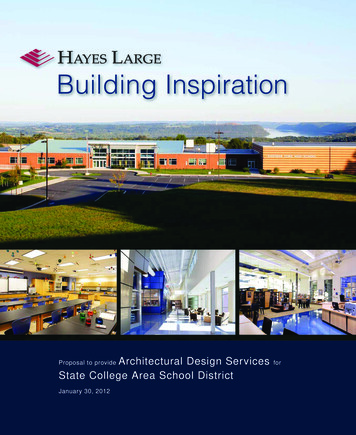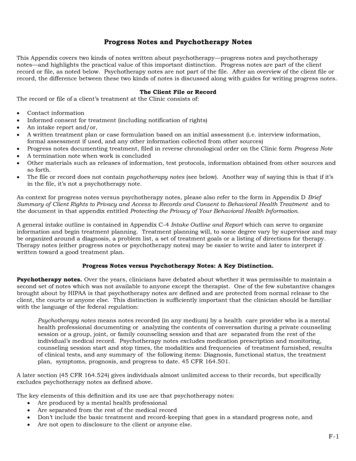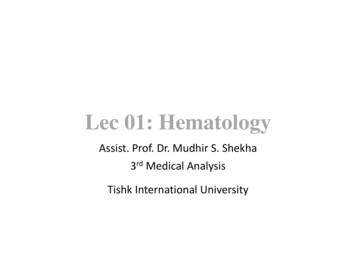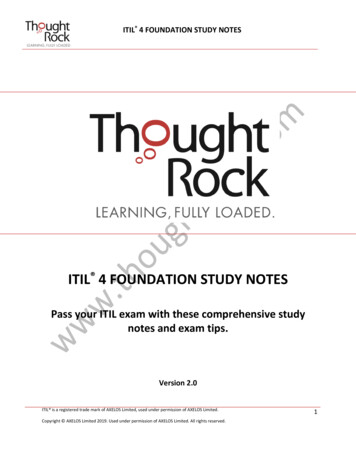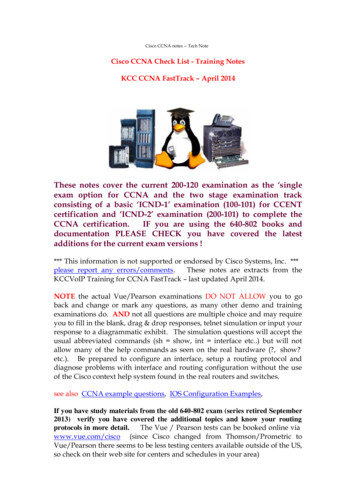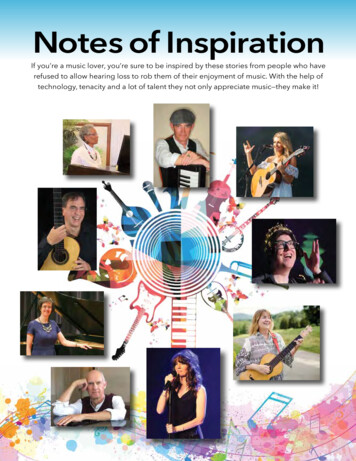
Transcription
Notes of InspirationIf you’re a music lover, you’re sure to be inspired by these stories from people who haverefused to allow hearing loss to rob them of their enjoyment of music. With the help oftechnology, tenacity and a lot of talent they not only appreciate music—they make it!
From College to Carnegie HallUnstrung by Hearing LossI experienced a sudden onset of hearing loss in both earsat 15 years of age. It left me with severe-to-profound loss,which has not worsened much over the years. I was alreadyplaying guitar in some local rock music groups with friendsand decided to continue playing despite my hearing loss.When I got to college, though, I met someonewho played classical guitar and I was completely hooked.I was totally awed by it and picked up a classical guitarsomewhere and just kept working at it with the help ofseveral very good, understanding teachers.Besides the beguiling beauty of the guitar music,the other thing that really attracted me to classical guitarwas the fact that it is a predominantly solo instrument.I did not have to worry about communicating with othermembers of a band or ensemble when I played it. I graduated cum laude from Syracuse University with a bachelor’s degree in music, concentrating on classical guitar,and then went on to Ithaca College, where I received amaster’s degree in the same field. I was immediately hiredto teach in the music department at Ithaca and began aperformance career that lasted about 15 years.The Big TimeI made my Carnegie Hall debut in 1987. In addition toperforming on the east coast, I also played several concerttours in the Far East, including Singapore, the Philippinesand Hong Kong. (Communicating with the many nonnative English speakers I encountered was quite a challenge!) Despite the difficulties I overcame, I decided tostop playing in 1992. I felt I had gone as far as I couldgo, and I wondered what it would be like to live whereI didn’t feel my hearing loss would be seen as somethingpeculiar. Along the way, I worked in the informationtechnology field, married a woman who was deaf, hadtwo beautiful children, later divorced and began anew.A 20th Birthday Shout Out to AAMHLSome HLAA members who have a special appreciationfor music are also members of the Association of AdultMusicians with Hearing Loss (AAMHL), a nonprofitorganization created by Wendy Cheng, an accomplished musician with hearing loss who was featured in thewinter 2021 issue of Hearing Life.BY CHARLES MOKOTOFFBy the time I picked up my guitar again in 2006after that long hiatus, I was wearing digital hearing aids;the sound of the guitar was different than I recalled frommy old days with analog hearing aids. It took a few yearsto adjust but fortunately, I found many friends whojoined me on that journey and had made similar adjustments themselves. I’m grateful for their friendship andglad I found my way back to my music.Charles Mokotoff holds bachelor’s and master’s degreesin guitar performance from Syracuse University andIthaca College, respectively. He has served on the facultiesof numerous colleges and universities in New York and theNew England area as a lecturer in classical guitar andlute. From the mid-1990s through his recent retirementfrom the National Institutes of Health, he was an information technology specialist focusing on web development,intranet technologies and system security. Currently, hemakes his home in Bethesda, Maryland, and spends most ofhis time practicing, recording, and performing classicalguitar. He is also an adjunct professor in the IT department at Gallaudet University in Washington, DC, wherehe teaches classes on IT ethics, social media and technicalwriting. Charles was the cover feature of the January/February 2010 issue of Hearing Loss Magazine.
Bionic WomanBY BLUE O’CONNELLCochlear Implantation to the RescueMany years ago, a musician friend invited me over to hearhis new piano composition. After waiting for what seemeda long time, I finally asked, “When are you going to play meyour new song?" He was stunned and replied, “I just did—didn’t you hear it?” I didn’t.That was how I learned that I had severe hearing loss.I was 25 years old, and doctors believed I was born withsome hearing loss that was further complicated by a case ofmononucleosis in my early 20s. For years I was able to hearwell enough with hearing aids but at the age of 50, I wasadvised to consider a cochlear implant (CI).Reestablishing My Connection to MusicI have learned a lot from my journey with hearing loss andmusic. Regaining music perception took months of persistence, concentration and patience. I worked with a musicteacher who drilled me with pitch perception, intervalrecognition and sight singing exercises. Musical intervals areanalogous to the alphabet in language. When doing speechrecognition exercises, we first focus on one-syllable words,graduate to small phrases and then move on to sentencesand stories.My music rehab followed this same logic. Initially Ifocused on intervals or the distance between two notes, andthen I graduated to melodies and finally to complete songs.I worked with a music teacher who used her piano to playcommon intervals found in many melodies. For example,an octave can be found in the first two notes in “Over theRainbow” and a perfect fourth in the first two notes of “HereComes the Bride.” By isolating these pitches, just as I isolatedthe alphabet in words, I was able to regain the perception ofthese sounds.Much of our work in CI rehab involves somethingcalled “neuroplasticity,” which is a process in which the brainreestablishes connections we had before the onset of hearingloss. My 30-plus years of musical training, beginning withpercussion in a high school band and later classical guitar,prepared me well for my CI auditory rehab, as it was similarto what I needed to succeed at being a good CI user.Music Practitioner, Singer/Songwriter and AuthorI also gained inclusion into a caring community of otherslike me who have hearing loss. Long considered an “invisible” disability, hearing loss can be quite isolating. It is awonderful experience to go from feeling left out to beingwelcomed into a supportive fellowship of others who walkthe same path.Since my implantation in 2009, I contributed to CIuniversity research studies around the U.S., participated as apanelist in the Symposium for Music and Cochlear Implantsin Montreal in 2016, and was a two-time finalist in the Beatsof Cochlea Music Festival in Warsaw. How my life has beengreatly enriched since becoming a bionic woman!Two years after implantation I left my office job of14 years and became a professional musician. I am a certifiedmusic practitioner, playing therapeutic music on my guitarfor hospital patients, people with disabilities and nursinghome residents. I am also a singer/songwriter and releasedmy first CD, Choose the Sky, in 2011. The recording tookfive years to complete because I took a break during myCI surgery and rehab.In 2020, I released an e-book, Seven Songs of Solace,for solo guitar, and I donated the proceeds to Doctors Without Borders (Medicins Sans Frontieres) and the Associationof Adult Musicians with Hearing Loss (AAMHL). Learnmore at blueoconnell.com.Blue O’Connell is a certified music practitioner, singer/songwriter, guitarist and public speaker. She grew up in inner cityChicago, where she cultivated a passion for the arts at anearly age. Since relocating to Charlottesville, Virginia, in 1989,she has been active in the local music scene, serving as a radioannouncer at WTJU for 20 years and performing locally. Bluereceived the Mildred W. Spicer Arts Fund Award in 2014 forher outstanding service improving artistic opportunities forpeople with disabilities. She is an artist-in-residence in theAlbemarle County School District.
A Song in My HeartB Y A N G E L A P. H I L LMy Passion for MusicImagine a little, six-year-old girl with her mother,walking out of a hearing aid dispenser’s office afterreceiving her first hearing aid. As her mother turns onthe radio in the car, the little girl instantly hears musicand immediately begins to be-bop (dance) to it. Thatlittle girl was me.In the early 1970s, I embarked upon my journeyinto the world of mainstream public school educationin Norfolk, Virginia, where I had a speech therapist fromelementary school to high school. Other than havinghearing loss, I was a typical child no different from otherkids. Yet, what shaped me personally as an individualwas my passion for music.In my early years, I had moderate-to-severe hearing loss that didn’t really create an obstacle to my loveand appreciation for music. Not long after receiving myfirst hearing aid, and later a second one for the oppositeear, I began taking piano lessons. I loved the piano, andI took lessons from two dynamic piano teachers. I alsotook organ lessons. In middle school and high school,I sang in the school chorus and girls’ ensemble, and Iwas even given the opportunity to audition and then beselected for the All-City Chorus. Music was my heart.Yet, I had no idea at that time that the type of hearingloss I had was progressive, and it was not until springof 2019 that I learned it is actually part of a syndrome.Discovering a Talent for TeachingBy the time I was in high school, I was determined tomajor in music education in college, and it was also inhigh school that my beloved piano teacher—the late,great Mrs. Ianthia Virginia Uzzle—saw my potential tobe a piano teacher. She positively affected my life in away that I still feel now. I did, in fact, teach piano for anumber of years even as my hearing loss progressively,insidiously worsened. I was unaware of just how stealthythe loss was until it was so obvious I couldn’t deny it.By the close of my senior year, just before I was to startcollege, I begin to suspect that something was terriblywrong with my hearing. Yet, I felt it could be fixed withstronger hearing aids. For four years, I persevered andeventually graduated from college, cum laude, with adegree in Public School Music. I even did my studentteaching at three public schools. Yet music, over time,was sounding more and more distorted.Hitting a Sour NoteBy 1988, I was also suffering from recruitment, or discomfort with sound volume, and tinnitus. Eventually, myprogressive hearing loss got to the point that I could nolonger teach piano, even though I had previously had asmany as 21 piano students at the height of my teachingcareer. Sadly, I was forced to close my music school.As a result, frustration, depression and evenflagging self-worth dominated my life in the early 1990s.Music no longer sounded pleasant, aside from the occasional deep bass my hearing aids managed to decipheron certain songs.Tuning In With TechnologyI began to research cochlear implants (CIs) to see if theymight help me, and it was my good fortune to meetWendy Cheng, the founder of the Association of AdultMusicians with Hearing Loss (AAMHL), who schooledme at greater depth about CIs. When my right ear wasimplanted in July 2012, and my left ear in December2015, hope returned! My implants were an absolutegame changer, and my life was transformed by the greatblessing made possible by this astounding technologicaldevelopment. After a 20-year hiatus, I was finally ableto return to my first love: playing the piano. And drumroll I can even sing again!Angela P. Hill continues to enjoy the gift of hearingthrough her cochlear implants. These days you can find herplaying her grand piano, which she named Hope, catchingup on all the years she could not play. Angela belongs toseveral disability-related organizations in the HamptonRoads region of the state of Virginia. She is married to herwonderful husband, Alex, a retired airman who served inDesert Storm. She can be reached at alex0027@cox.net.
A Little Help from My FriendsB Y D AW N M O L L E N K O P FIwas born with bilateral, moderate-to-moderatelysevere hearing loss caused by Branchio-oto-renalsyndrome. My hearing loss did not become progressive until I reached my 30s, and at the moment,it has progressed from severely profound to profound.However, as a child, I was always drawn to musicand made my debut early one morning when I was fourby turning on my mother’s electronic keyboard to fullvolume, putting my ear directly to the keys and pickingout the tune “Mary Had A Little Lamb.” I started pianolessons at age eight and violin at age 13, continuingwith both instruments throughout my college yearsand performing in an orchestra.A Music Major With a Minor ObstacleI experimented with majoring in music in college, withthe piano as my major instrument but my piano teacherat the time was strongly unsupportive. He believed thatmy hearing loss would prevent me from performing“naturally” and thought I should accept this limitation.Frustrated, I switched majors and kept up with music onmy own for a while, performing the first movement of theGrieg Piano Concerto in A Minor at my grandmother’snursing home. Shortly thereafter, life events took me in adifferent direction, and I discontinued both instruments.Up to that point, I had not really done anythingvocally except sing with friends in small groups or perform in choirs. My primary challenge was that I couldhear myself but could not hear anyone else or any accompaniment, so I tended to under-sing, which affected myvoice tone. However, I moved to a new town to startmy doctoral degree and joined a tiny synagogue thatwas desperate for a musician. Because their music wasperformed a capella, or without accompaniment, I wasin control and could easily sing solo. Within a few years,I became the lay musician people relied on when theycould not get a cantor or rabbi.Singing the Praises of Supportive FriendsBy this time, my hearing loss had progressed to thepoint that I could no longer hear myself effectively,and I was concerned that I would not be able to continueto perform. I consulted my audiologist, who told methat hearing aids were for speech
playing guitar in some local rock music groups with friends and decided to continue playing despite my hearing loss. When I got to college, though, I met someone who played classical guitar and I was completely hooked. I was totally awed by it and picked up a classical guitar somewhere and just kept working at it with the help of several very good, understanding teachers. Besides the beguiling .
